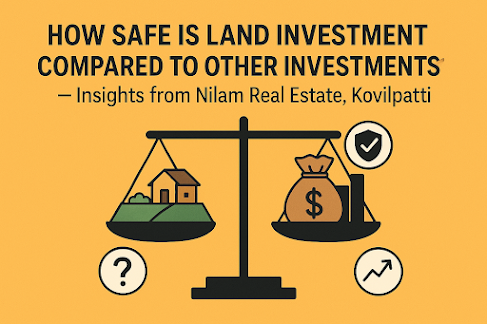Does a Grandson Have a Legal Right in
Grandfather’s Property? – Explained by Nilam Real Estate Consultant, Kovilpatti
When it comes to inheritance and property rights, one of the most
frequently asked questions is: “Does a grandson have a share in his
grandfather’s property?” The answer is: it depends on various legal factors
such as how the property was acquired, the family structure, and whether a Will
exists.
As a trusted real estate consultant in Kovilpatti, Nilam explains the legal
aspects in a clear and simplified way—especially useful if you're planning to
buy an individual house in Kovilpatti, invest in ancestral land, or deal with
property transfers.
1. How Did the Grandfather Acquire the Property?
If it is a Self-Acquired Property:
·
If the grandfather purchased or earned the property by himself, he has full
legal rights over it.
·
He can sell, gift, or Will it to anyone he chooses, including people
outside the family.
·
In such cases, the grandson does not have any direct legal claim over the
property.
If it is Ancestral Property:
·
If the property was inherited by the grandfather from his father
(great-grandfather), then it is considered ancestral property.
·
A grandson automatically gets a share in ancestral property from the moment
he is born.
·
The grandfather cannot sell or gift this property without the consent of
all legal heirs. If he does, the grandson can challenge it in court.
This distinction is important for anyone looking to buy or invest in
residential land, ancestral houses, or farm land for sale in Kovilpatti.
2. Is the Father Still Alive?
Under Indian law, a grandson inherits rights through his father.
·
If the father is alive, the grandson cannot directly claim the
grandfather's property (ancestral or otherwise).
·
But if the father has passed away, the grandson can claim the father's
share in the grandfather's property.
This is a crucial legal point for families dealing with plots for sale in
Kovilpatti or transferring agricultural land from one generation to another.
3. Did the Grandfather Write a Will?
If a Will (legal document) has been written by the grandfather, here’s what
it means:
·
The Will is valid only for self-acquired property.
·
A Will cannot override rights to ancestral property. So, even if a
grandfather writes a Will for an ancestral house, the grandson still holds a
rightful share in that property.
This is particularly relevant for buyers looking at residential plots for
sale, ancestral properties, or individual houses for sale in Kovilpatti with
unclear ownership histories.
Why This Matters for Property Buyers in
Kovilpatti
Understanding these legal points is crucial if you're planning to:
·
Buy individual house in Kovilpatti
·
Invest in commercial property for sale in Kovilpatti
·
Purchase ancestral or inherited land
·
Explore agri land for sale in Kovilpatti
·
Buy plots in Kovilpatti with previous family ownership
Whether it’s a commercial building, a farm land, or a residential plot,
knowing who holds the rightful ownership helps you avoid legal disputes in the
future.
How Nilam Real Estate Consultant in Kovilpatti
Can Help
·
We verify the title and ownership of all properties before listing
·
We help you understand legal complications around inherited and ancestral
properties
·
We offer expert support whether you're looking to buy land in Kovilpatti,
invest in commercial land, or purchase an individual house
Conclusion
Yes, a grandson may have a share in the grandfather’s property—but only if
it's ancestral, and subject to conditions. If you're planning to invest in a
family-owned property in or around Kovilpatti, legal clarity is essential.
Nilam – Real Estate Consultant in Kovilpatti is here to help you make
informed, safe, and legally sound property decisions.
Need assistance buying residential or commercial
property in Kovilpatti?
Contact Nilam today to explore verified listings of:
·
Individual houses
·
Plots and residential land
·
Commercial buildings
·
Agricultural and farm land
Let us guide you to the right investment, backed by legal knowledge and real estate expertise.





Comments
Post a Comment